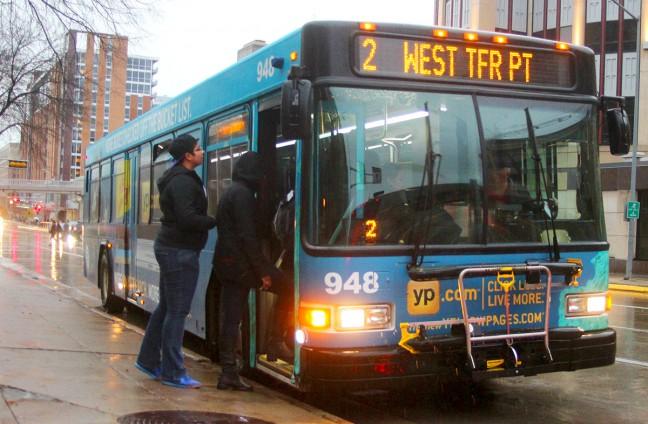The bus system on campus at the University of Wisconsin has a general reputation of being unreliable, according to University of Wisconsin junior Nandini Saluja. Buses are often not on time and when they are, they are overcrowded and often hard to squeeze onto. In order to make it to class on time, an extra 20 to 3o minutes needs to be factored into travel time, Saluja said.
UW student and District 8 Ald. MGR Govindarajan is also affected by the unreliability of the bus system.
“When winter starts, it [the 80] gets pretty unreliable, with the other buses not as much … but with bus 80, 82 and 81 are the ones I’ve personally taken a lot,” Govindarajan said. “As soon as the snow hits, it gets a little bit difficult. 80 for example, is supposed to be running every five to seven minutes, but that’s not usually the case.”
Within the City Council there is a new committee to deal with transportation issues, the Transportation Commission, started only a few months ago according to Govindarajan.
Before the commission was created, there were a few different committees related to transportation that combined to create the Transportation Commission, Govindarajan said. Transportation issues were at the forefront of Govindarajan’s election efforts and are an issue he continues to advocate for as a member of the Transportation Commission.
In order to help address the issue of unreliability and limited service on the weekends, both the university and the city have to come to the table willing to work together, according to Govindarajan.
“Now would be a better time to do so, mainly because there are a lot of changes happening with the buses as is, so we can potentially put this forward right now,” Govindarajan said.
The bus systems on the UW campus are a part of the City of Madison Metro Transit Services, but are managed by the UW Transportation Services and Campus Transportation Committee.
Transportation Services manages all parking and transportation activities for the UW campus, according to Commuter Solutions Manager for Transportation Services Dar Ward.
The Campus Transportation Committee is a shared governance group of faculty, academic staff, university staff and student representatives who provide advice and recommendations on budgetary and operational decisions for Transportation Services, according to Ward.
Communication between the City of Madison and UW is through the Transportation Services team, who email frequently to troubleshoot issues and have monthly meetings with Madison Metro alongside members of the Associated Students of Madison bus pass program, according to Director of Media Relations and Strategic Communication Kelly Tyrrell.
Madison Metro coordinates any detours due to construction or events with the city and with university staff to try and combat possible delays, Ward said. After unexpected road closures last year during a snowstorm, Transportation Services now works closely with UWPD and University Communications to make sure the campus is notified of any emergencies.
The 80 bus routes, the campus’ primary lines, are unique from other bus lines, as they run rush-hour service all day until 3 a.m., with most other Metro lines only offering limited midday service and rush-hour during the morning and evenings, according to Ward.
But, even with service for the 80 lines running longer than the others, reliability is still an issue, according to Saluja. Additionally, other routes like the C bus line, specifically mentioned by Saluja, can be seen as problematic.
“If I want to get to class at 7:45, I need to leave my house as early as possible because I need to be there five minutes before the bus departs,” Saluja said. “And then also five minutes after or if it’s delayed 10 minutes, I need to be there just waiting for the bus to come.”
A relatively small change that has made a difference in everyday functions is the addition of two new 80 buses on the weekdays, helping with the reliability and the frequency of the buses. But this has not completely solved the problem, Govindarajan said.
These transportation issues are not just on the city side, something Govindarajan had to learn after being elected.
“A lot of this is contractual obligations that go through, and both parties need to come to the table to be able to increase anything,” Govindarajan said.
Buses on the weekend can often be crowded and unreliable, something the university is aware of, Tyrrell said. But, the Metro does not currently have enough funding to add more buses and drivers to the weekend campus routes, according to Ward.
The campus bus service is funded through segregated fees, parking revenues and Eagle Heights resident rent, so in order to expand bus service, one or more of these funds would have to be increased to compensate, according to Tyrrell.
Students can always provide feedback to Madison Metro about improvements to bus routes, particularly after the changes to routes that occurred over this past summer, Tyrrell said. They can also reach out to Transportation Services, who are in ongoing direct communication with the Madison Metro.


